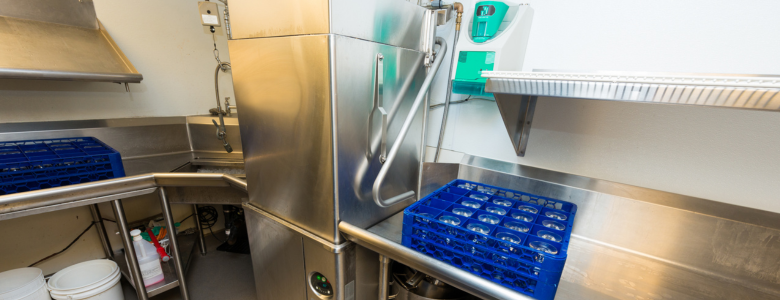
Can You Use Dishwashing Liquid in a Dishwasher? Dos and Don'ts Explained
You run out of dishwasher detergent—what now? You might think using regular dish soap is a simple solution, but hold on!
That quick fix could turn into a big, bubbly disaster. Dish soap creates excessive suds that can overflow, leave a sticky residue, and even damage your dishwasher over time.
In this post, we'll explain why dish soap doesn't belong in your dishwasher, what to do if you've already made the mistake, and what safe alternatives you can use instead. Plus, we'll go over some must-know dishwasher rules to keep your dishes clean and your machine in top shape.
TL;DR: Dish Soap in the Dishwasher? Here's Why It’s a Bad Idea!
- "Can I use dishwashing liquid in a dishwasher?" No, you shouldn’t use dish soap in a dishwasher!
- Regular dish soap creates excessive suds that can overflow and cause a mess.
- It leaves a sticky residue inside the dishwasher and on your dishes.
- Over time, it can clog your machine and cause damage.
- Always use dish detergent specifically designed for your machine.
- If excessive soap suds appear, wipe them up with dry towels to prevent damage to your kitchen floor.
What Happens If You Use Regular Dish Soap in a Dishwasher?
If you pour regular dishwashing liquid into your dishwasher, here’s what will likely happen:
- Too many bubbles! The soap creates excessive suds that can leak out of the dishwasher and onto your kitchen floor.
- Residue buildup. Dish soap leaves behind a soapy film on your dishes and inside your dishwasher, making everything feel greasy or sticky.
- Potential damage. Over time, the excess suds and residue can clog parts of your dishwasher and shorten its lifespan. Too much detergent can also affect the dishwasher's performance.
- Soap scum and poor cleaning performance. The remaining soap may cause a buildup inside the dishwasher cycle, leaving dishes unclean.
Dish soap might be a kitchen essential, but do you really know how it works? Learn more about dishwashing liquid and how to use it effectively here.
What to Do If You’ve Used Dishwashing Liquid by Mistake
Oops! If you’ve already added incorrect liquid detergent to your dishwasher, don’t panic. Here’s how to fix it:
- Stop the dishwasher immediately. If it’s mid-cycle, cancel it.
- Scoop out the bubbles. Remove as many suds and soapy water as you can using a towel or container.
- Rinse the dishwasher. Wipe down the inside and run a rinse cycle with no detergent to clear out any leftover soap.
- Use vinegar for extra cleaning. Add a cup of white vinegar and run another rinse cycle to break down the remaining residue.
- Check the dishwasher door and soap container. Ensure all soap residue is removed before starting another wash cycle.
Safe Alternatives to Dishwashing Liquid
If you’re out of dishwasher detergent, don’t worry! Here’s what you can safely use:
Dishwasher Detergent (The Best Choice)
Always use detergent specially formulated for dishwashers. It comes in tablets, powder, or gel and is designed to clean dishes without creating excessive suds. Dishwasher detergent relies on enzymes and cleaning agents to break down food particles effectively.
- Tablets: These are pre-measured and convenient, often containing a mix of detergent, rinse aid, and other cleaning agents for optimal performance. They’re great for deep cleaning and reducing water spots.
- Powder: Offers flexibility in how much detergent you use. It’s effective at cutting through grease and tackling tough stains but requires careful measuring to avoid using too much detergent.
- Gel: Dissolves quickly and is less abrasive than powders, making it ideal for delicate dishes. However, it may not be as strong as tablets or powder when dealing with heavy grease or stuck-on food.
Choosing the right dishwasher detergent matters—only detergents specially designed for dishwashers can break down grease, remove food particles, and prevent soap residue. Explore different dishwasher detergent options from StellarChem here.
Emergency Substitutes (Baking Soda & Vinegar – With Caution!)
If you’re desperate, you can try this once in a while:
- Baking soda: Sprinkle one tablespoon into the detergent compartment. It helps with grease and odours but won’t clean as well as a dishwashing detergent.
- White vinegar: Place half a cup in a dishwasher-safe cup on the top rack. It helps remove residue but should never be mixed with baking soda inside the detergent compartment.
Important: These are temporary solutions! Regular dishwasher detergent is always the best option.
If you want to make your own dishwasher detergent, a good recipe includes baking soda, kosher salt, and a few drops of cooking oil.
Must-Know Dishwasher Rules
To keep your dishwasher running smoothly, follow these key dos and don’ts:
The Dos
✅ DO use dishwasher detergent designed for your machine.
✅ DO scrape off food scraps before loading dishes.
✅ DO clean your dishwasher regularly to prevent residue buildup.
✅ DO check your manufacturer’s guide for best practices.
✅ DO properly rinse your dishes before placing them inside.
✅ DO run a quick cycle if your dishwasher needs a refresh.
The Don'ts
❌ DON’T use regular dish soap—it creates a bubbly disaster!
❌ DON’T overload your dishwasher; dishes need space to get cleaned properly.
❌ DON’T mix baking soda and vinegar inside the detergent compartment.
❌ DON’T put dish soap directly into the dishwasher's soap container.
❌ DON’T rely on ordinary dish liquid or liquid dish soap as a straight substitution for dishwasher detergent.
Want to make sure your dishes are always spotless, whether you hand wash or use a dishwasher? Check out this guide on the 7 essential steps to washing dishes properly here.
Conclusion
While it might seem like a quick fix, using regular dishwashing liquid in your dishwasher is a big no-no. It creates too many suds, can leave residue, and even damage your machine. If you ever make this mistake, just follow our quick fix guide to clean things up.
And if you run out of detergent, stick to safe emergency alternatives like baking soda or vinegar—just not too often! Dishwasher pods and automatic dishwasher detergent are your best long-term options for sparkling dishes and a cleaner dishwasher.
By following these guidelines, you’ll keep your dishwasher working efficiently and your dishes clean. Always check your owner’s manual for specific instructions related to your machine!
Keeping your kitchen clean goes beyond just washing dishes. Discover more commercial cleaning solutions from StellarChem here.
FAQs
Can you put normal dishwashing liquid in a dishwasher?
No! Regular dish soap creates too many suds, which can lead to leaks, residue, and potential damage to your dishwasher.
What to use if you're out of dishwasher detergent?
The best alternative is baking soda (1 tablespoon in the detergent compartment) or white vinegar (½ cup in a dishwasher-safe container on the top rack). These aren’t perfect substitutes, but they can help in an emergency.
What can you use instead of dishwasher tablets?
You can use dishwasher powder or gel—just follow the recommended amount on the packaging.
Can I put a few drops of dish soap in the dishwasher?
No! Even a small amount or just a few drops of dish soap will create too many bubbles and could cause a mess.
Why regular dish soap should never replace dishwasher detergent long-term?
Ordinary dishwashing soap combined with the dishwasher cycle will result in foamy suds, soap bubbles, and poor cleaning performance.
